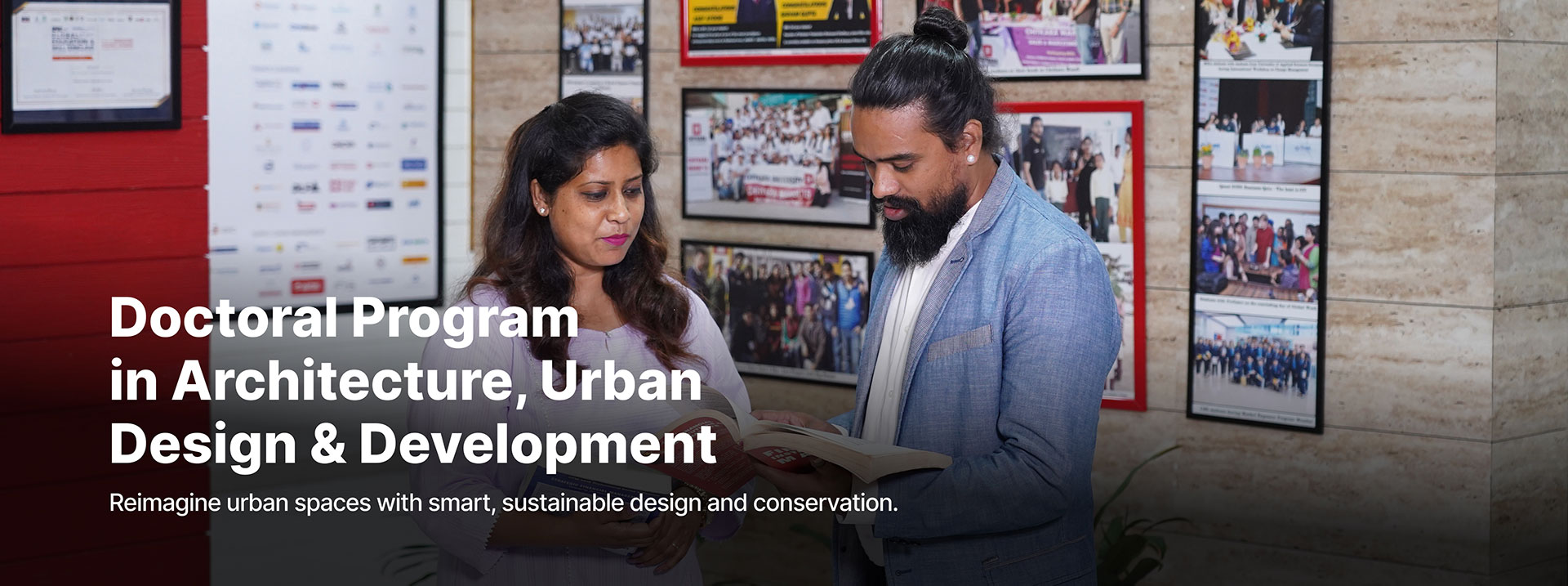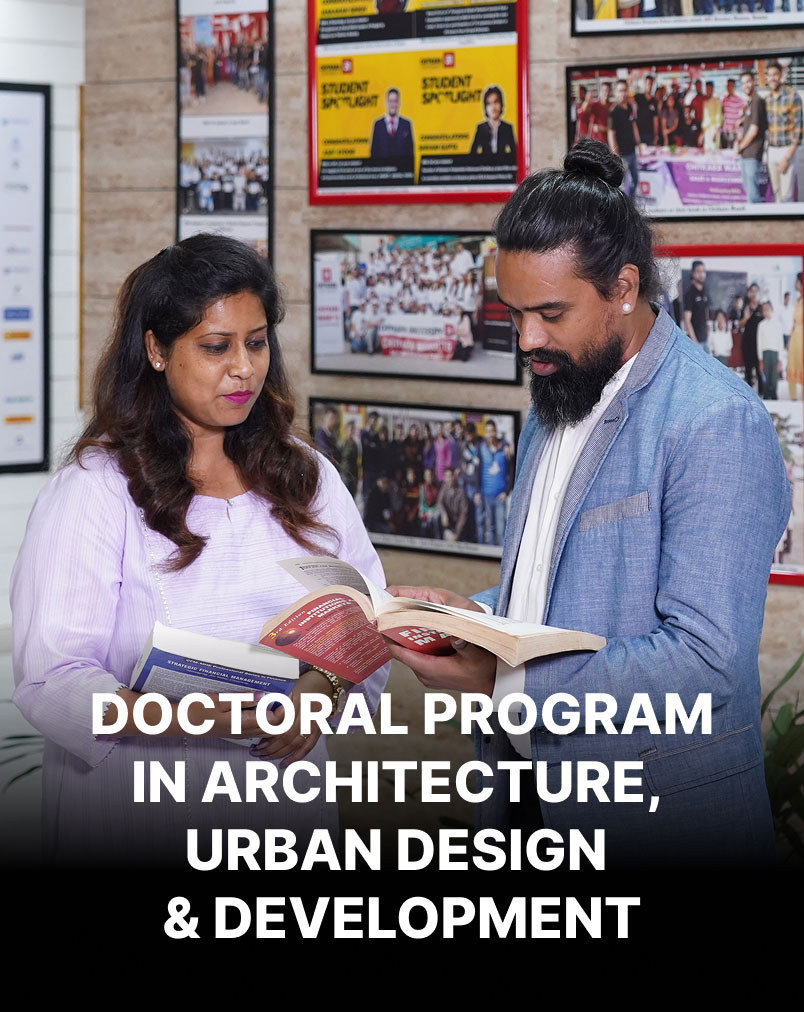PhD Program
in Architecture Urban Design & Development
The PhD Program in Architecture at Chitkara University is a rigorous and research-driven program aimed at advancing knowledge in the historical, theoretical, and technological dimensions of architecture, landscape architecture, and historic preservation. Operating within the dynamic environment of a design school, it fosters an interdisciplinary approach, encouraging scholars to engage with diverse perspectives while contributing to architectural discourse. The program provides an intellectual platform for students to critically examine the evolution of architectural knowledge, rethinking traditional methodologies, and exploring innovative frameworks to shape the built environment of the future.
Furthermore, the PhD in Architecture at Chitkara University delves into the impact of social, economic, and technological transformations on modern architectural forms and ideas. It encompasses an in-depth analysis of the connections between architectural practice, urban development, civil institutions, and society. Through advanced research, students contribute to pioneering solutions that address contemporary challenges, ensuring sustainable and meaningful architectural advancements in a rapidly evolving world.
Be a part of India’s Top Rated University
Program Overview
The PhD program in Architecture, Urban Design, and Development (AUDD) at Chitkara University offers designers and professionals in design and allied fields the opportunity to transcend traditional disciplines and broaden their expertise. This unique program fosters active participation in research across academic communities, equipping scholars with critical analytical and research writing skills. Through its carefully designed modules, the curriculum introduces scholars to diverse professional themes, fostering a comprehensive understanding of architecture and its related domains. Additionally, researchers develop the ability to apply multidisciplinary tools and methodologies to address contemporary challenges, with the motivation to translate knowledge into practical applications. This approach expands the boundaries of architecture, urban design, and development, ensuring impactful contributions to the field.

What to Expect
The PhD program at Chitkara University will prepare you for an outstanding career in research and teaching. Right from your first semester, you’ll get to work with faculty mentors across your field as you investigate the challenges that interest you. Our doctoral program students have the ability—and diligence—to study complex issues that the world right now faces.
Transferrable Career Skills
Our PhD program equips scholars with skills beyond academia, preparing them for leadership, entrepreneurship, and industry roles. Through innovative pedagogy, mentoring, and hands-on learning, researchers gain critical thinking, problem-solving, and communication expertise, ensuring they excel in diverse professional landscapes beyond traditional academic settings.
Global Research Exposure
PhD students present their work at leading conferences, engaging with experts and showcasing their research on international platforms. These opportunities expand academic visibility, foster collaborations, and provide insights into emerging trends, ensuring scholars stay ahead in their fields while strengthening their professional and scholarly impact.
Student Support
Faculty mentors guide scholars through every stage of research, from idea generation to publication. Encouraged to collaborate with multiple faculty members, students gain diverse perspectives, fostering intellectual growth, refining research skills, and ensuring they navigate their academic journey with confidence and clarity.
Collaborative Research Culture
Our PhD program thrives on interdisciplinary collaboration. Working with peers, faculty, and researchers, students engage in meaningful exchanges that enhance research quality. This team-driven approach fosters innovation, accelerates discoveries, and creates an environment where collective intelligence drives impactful and pioneering research.
Admission Eligibility
The candidates for the program must have one of the following qualifications obtained from any of the universities incorporated by an Act of the central or state legislature India or other educational institutions established by an act of parliament or declared to be deemed as a university under Section 3 of the UGC Act 1956 or possess an equivalent qualification recognised by the Ministry of HRD, Government of India or equivalent qualification from an institution approved by AICTE.
- A 2-year/4-semester Master’s degree program in a relevant discipline after a 4-year/8 semester Bachelor’s degree program or
- A 2-year/4-semester Master’s degree program in a relevant discipline after a 5-year/10 semester Bachelor’s degree program or
- Qualifications declared equivalent to the Master’s degree in a relevant discipline by the corresponding statutory regulatory body, with at least 55% marks in aggregate or
- An equivalent qualification from a foreign educational institution accredited by an assessment and accreditation agency which is approved, recognised or authorised by an authority, established or incorporated under a law in its home country or any other statutory authority in that country to assess, accredit or assure quality and standards of the educational institution or
- A 4-year/8-semester Bachelor’s degree program in a relevant discipline with a minimum of 75% marks in aggregate or its equivalent grade on a point scale wherever the grading system is followed or
- A 5-year/10-semester Bachelor’s degree program in a relevant discipline with a minimum of 75% marks in aggregate or its equivalent grade on a point scale wherever the grading system is followed
Note: Relaxation for reserved categories as per UGC norms.
Program Fee Structure
| Fee Components | Amount |
|---|---|
| Enrolment Fee | Rs. 30,000/- |
| Career Advancement Services Fee | Rs. 20,000/- |
| Course Work Fee 1 | Rs. 25,000/- |
| Course Work Fee 2 | Rs. 25,000/- |
| Course Work Fee 3 | Rs. 25,000/- |
| Doctoral Seminar on Specialisation | Rs. 60,000/- |
| Research Proposal Seminar | Rs. 60,000/- |
| Progress Review Seminar 1 | Rs. 20,000/- |
| Progress Review Seminar 2 | Rs. 20,000/- |
| Progress Review Seminar 3 | Rs. 20,000/- |
| Pre-Thesis Submission | Rs. 40,000/- |
| Thesis Submission & Defence | Rs. 75,000/- |
| Total | Rs. 4,20,000/- |

How to Apply?
Candidates who fulfil the eligibility criteria, must fill the admission form with required documents of all particulars to be attached. All application forms will be screened by a separate screening committee whose representatives will be from Doctoral Research Committee and Experts from the University in the respective areas. Shortlisted candidates based on academic record and experience will appear for a written test conducted by the University.
Program Structure
The curriculum includes compulsory coursework, research proposal and objectives, research work and progress, pre-thesis work, and thesis defense.
The course work comprises of five components: research methodology, advanced research methodology, doctoral foundation seminar, doctoral concentration seminar, and research & publication ethics. After successfully completing coursework, the research scholar works in close coordination and under the strict supervision of his / her research guide, prepares the research proposal, and identifies the objectives of the research work.
Progress of the research work is reviewed every six months and finally, the scholars submit their thesis and defend it. The Doctoral Research Committee (DRC) closely mentors and monitors this process.
| Phase | Sub components | Outcome |
|---|---|---|
| Course Work | Research Methodology | Enabling scholars to purse research in a methodical manner |
| Advanced Research Methodology | Enabling scholars to know about tools and technologies to process their data | |
| Doctoral Foundation Seminar | Enabling and equipping scholars with required tools and technologies in their broad discipline area | |
| Doctoral Concentration Seminar | a) Motivation to Research, b) identification of base paper(s), c) State-of-art, d) Identification of research gaps, e) Identification of Tools/Technologies for conducting proposed research | |
| Research & Publication Ethics | Sensitisation towards research; Ethics and respect to science and research integrity; Intellectual honesty and research integrity; Scientific misconducts; Falsification, Fabrication and Plagiarism | |
| Submission of Research Proposal | Extensive literature review / patent data bases, research proposal submitted to Dean (DRC) in prescribed format | |
| Progress Seminar – I | Progress on identified research objectives | |
| Progress Seminar – II | Progress on identified research objectives | |
| Progress Seminar – III | Progress on identified research objectives | |
| Pre Thesis Seminar | Achievement of all objectives, Thesis ready in final shape, Research paper(s) communicated to Conferences / Journals | |
| Thesis Submission and Defence | Eligibility for award of PhD degree |
Concentrations Offered
Immerse yourself in applied high-tech research and complex topics alongside renowned faculty experts in our state-of-the-art research labs. Select from our future-focused concentrations:
Framework for Phd Program
The steps you take today lay the foundation for your future success. At Chitkara University, we cultivate bright minds into changemakers, equipping them with strong fundamentals, a global perspective, and leadership skills to make a meaningful difference in the world.














